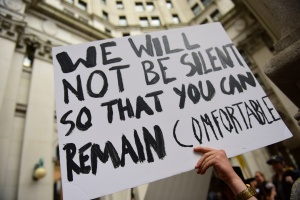Difference between revisions of "Freedom of Expression"
| Line 2: | Line 2: | ||
==Politics and Free Speech== | ==Politics and Free Speech== | ||
| − | Issues revolving around freedom of expression and hate speech arose during the 2016 election. The extremism of this election created a drastic polarization of both political parties in the United States. As Misha Teplitskiy and Feng Shi describe in “The Wisdom of Polarized Crowds,” people have used their freedom of expression in the form of politics even if the content is not related to political climate <ref> Teplitskiy and Shi (2018). The Wisdom of Polarized Crowds.</ref> When looking through social media platforms, specifically Facebook and Twitter, it is inevitable to not find a political argument taking place. Even if politics are uncomfortable to talk about, people have the right to post due to their right to free speech. [[File:Freespeechsign.jpg|thumbnail| | + | Issues revolving around freedom of expression and hate speech arose during the 2016 election. The extremism of this election created a drastic polarization of both political parties in the United States. As Misha Teplitskiy and Feng Shi describe in “The Wisdom of Polarized Crowds,” people have used their freedom of expression in the form of politics even if the content is not related to political climate <ref> Teplitskiy and Shi (2018). The Wisdom of Polarized Crowds.</ref> When looking through social media platforms, specifically Facebook and Twitter, it is inevitable to not find a political argument taking place. Even if politics are uncomfortable to talk about, people have the right to post due to their right to free speech. |
| + | [[File:Freespeechsign.jpg|thumbnail|Free speech sign at a protest via James Devereaux of Foundation of Economic Education.]] | ||
==Social Media Terms & Conditions== | ==Social Media Terms & Conditions== | ||
==Ethics and Freedom of Expression== | ==Ethics and Freedom of Expression== | ||
==References== | ==References== | ||
Revision as of 00:28, 14 March 2019
Freedom of expression is a concept that many remember from United States history and the creation of the Constitution. Our First Amendment allows the freedom of speech, press, and assembly. As technology advances, the topic around freedom of expression has evolved; what counts as free speech and what crosses the line into hate speech? The rise of social media has also brought different terms and conditions, like Twitter’s, to the forefront and caused controversy as to what material should be restricted or not. Freedom of expression has also been used as a loophole for cyberbullying and causes users to debate whether or not to report content.
Contents
Politics and Free Speech
Issues revolving around freedom of expression and hate speech arose during the 2016 election. The extremism of this election created a drastic polarization of both political parties in the United States. As Misha Teplitskiy and Feng Shi describe in “The Wisdom of Polarized Crowds,” people have used their freedom of expression in the form of politics even if the content is not related to political climate [1] When looking through social media platforms, specifically Facebook and Twitter, it is inevitable to not find a political argument taking place. Even if politics are uncomfortable to talk about, people have the right to post due to their right to free speech.
Social Media Terms & Conditions
Ethics and Freedom of Expression
References
- ↑ Teplitskiy and Shi (2018). The Wisdom of Polarized Crowds.
